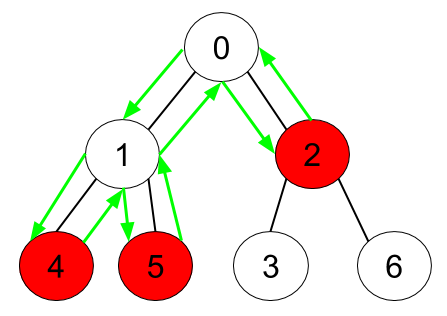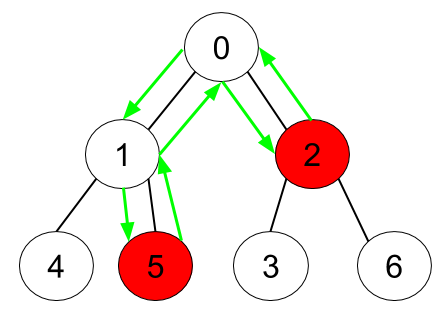Given an undirected tree consisting of n vertices numbered from 0 to n-1, which has some apples in their vertices. You spend 1 second to walk over one edge of the tree. Return the minimum time in seconds you have to spend to collect all apples in the tree, starting at vertex 0 and coming back to this vertex.
The edges of the undirected tree are given in the array edges, where edges[i] = [ai, bi] means that exists an edge connecting the vertices ai and bi. Additionally, there is a boolean array hasApple, where hasApple[i] = true means that vertex i has an apple; otherwise, it does not have any apple.
Input: n = 7, edges = [[0,1],[0,2],[1,4],[1,5],[2,3],[2,6]], hasApple = [false,false,true,false,true,true,false] Output: 8 Explanation: The figure above represents the given tree where red vertices have an apple. One optimal path to collect all apples is shown by the green arrows.
Input: n = 7, edges = [[0,1],[0,2],[1,4],[1,5],[2,3],[2,6]], hasApple = [false,false,true,false,false,true,false] Output: 6 Explanation: The figure above represents the given tree where red vertices have an apple. One optimal path to collect all apples is shown by the green arrows.
Input: n = 7, edges = [[0,1],[0,2],[1,4],[1,5],[2,3],[2,6]], hasApple = [false,false,false,false,false,false,false] Output: 0
1 <= n <= 105edges.length == n - 1edges[i].length == 20 <= ai < bi <= n - 1hasApple.length == n
use std::collections::HashSet;
impl Solution {
pub fn min_time(n: i32, edges: Vec<Vec<i32>>, mut has_apple: Vec<bool>) -> i32 {
let n = n as usize;
let mut children = vec![HashSet::new(); n];
let mut parent = vec![n; n];
let mut nodes = vec![0];
for edge in &edges {
children[edge[0] as usize].insert(edge[1] as usize);
children[edge[1] as usize].insert(edge[0] as usize);
}
while let Some(node) = nodes.pop() {
children[node].remove(&parent[node]);
for &child in children[node].iter() {
parent[child] = node;
nodes.push(child);
}
}
for node in 0..n {
if children[node].is_empty() {
nodes.push(node);
}
}
while let Some(node) = nodes.pop() {
if node == 0 {
break;
}
has_apple[parent[node]] |= has_apple[node];
children[parent[node]].remove(&node);
if children[parent[node]].is_empty() {
nodes.push(parent[node]);
}
}
((0..n).filter(|&node| has_apple[node]).count() as i32 - 1).max(0) * 2
}
}
